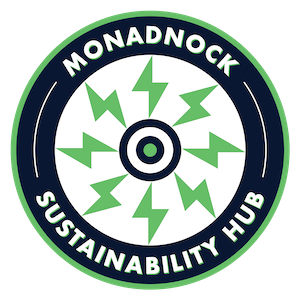By Catherine Owen Koning, Originally Published in The Monadnock Shopper News, Green Monadnock column, October 2025.
Last week, while working with my Franklin Pierce students to harvest tomatoes, basil, flowers and other goodies from the campus garden in Rindge, we discussed how local food represents a truly sustainable solution to many environmental problems. Actions we take to solve our environmental problems must must be economically, socially and environmentally sustainable. Working in the bright sunlight together, chatting about our day, contributes to social sustainability because we made nice connections with each other. The food we were harvesting was given out for free to students on campus, helping them save money, and bringing them joy (they particularly love the flowers!). Since we didn’t have to drive anywhere to get the veggies, and we used no pesticides or chemical fertilizer, the environmental impact of our homegrown food was much lower than store bought tomatoes from Florida.
The climate impact of local foods is much smaller than conventionally grown food, since less greenhouse gases are produced from chemical fertilizer use, big machinery, and transporting the food to the store. About 20% of our greenhouse gas production around the world comes from agriculture, including methane from manure, nitrous oxides from chemical fertilizer, carbon dioxide from disturbing the soil, as well fossil fuels used in the equipment. If you count the impacts of converting carbon-absorbing forests and natural areas to farm fields, greenhouse gas production is as high as 30% of the total.
But you don’t have to grow your own food to decrease your impact on climate and achieve all the other positive impacts. Local farmers do all the work for you! The Monadnock region is blessed with a multitude of farms, providing local eggs, milk, cheese, nuts, grains, veggies, fruits, honey, syrup and other tasty items. You can get these delicious foods at farmstands and farmer’s markets, and at the Monadnock Food Co-op in Keene, Nature’s Green Grocer in Peterborough, the Sullivan Country Store on Rte 9, and even some of the regional grocery store chains.
Many farms offer open purchases at the farm stand, such as Coll’s Farm in Jaffrey or Manning Hill Farm in Winchester. I just stopped in at Dog Days Farm in Fitzwilliam on my way home, and picked up fresh eggs, butternut squash and salad greens. Other farms operate on a membership basis, known as Community Supported Agriculture (CSA). In a CSA, you pay for your share at the start of the season, which guarantees the farmer a set number of customers and makes it easier to plan their crops. Check out Sun Moon CSA in Rindge or Hillsprings Farm CSA in Westmoreland.
For a complete list of Monadnock farms and farmer’s markets, go to the Monadnock Farm and Community Coalition: https://mfcommunitycoalition.org/
What you eat is easily as important as where your food comes from, in terms of its effect on the climate. Animal products have a much higher climate impact, including beef, dairy, sheep, pork and goat meat, compared with plant-based foods. Cows and sheep digest plant fibers in specialized digestive systems that use bacteria to break down the tough plant fibers, causing them to belch out methane, a powerful greenhouse gas that traps in about 30 times more heat per molecule than carbon dioxide. Meat and dairy products are responsible for 15% of greenhouse gases. If you are seeking to reduce your climate impact, try some vegan recipes. Eating a plant-based burger instead of a beef patty would produce only 3% of the greenhouse gases!
The Institute for Climate Action at Franklin Pierce will host the Seasons of Change Climate Harvest Fair at Franklin Pierce in Rindge, on Friday Oct. 24 from 12-3. Visitors can sample dishes made with locally sourced vegetables, fruits, eggs, etc., including vegan dishes. The event will also feature climate and harvest-themed games, climate trivia contest, and we are hoping for a special visit from Buddy the goat and Gronk the pig, celebrities from the Amazing Grace Animal Sanctuary in Sullivan, NH, whom we will enjoy as animal ambassadors rather than prospective meals! Contact Catherine Koning if you are interested in donating locally grown food for the event. koningc@franklinpierce.edu, 603-899-4322.
Catherine Owen Koning is a Professor of Environmental Science at Franklin Pierce University, where she co-coordinates the Institute for Climate Action. She is also a member of the Monadnock Sustainability Hub’s Board of Directors and co-chairs the Keene Clean Energy Team.
